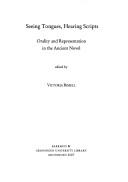| Listing 1 - 10 of 23 | << page >> |
Sort by
|
Book
Abstract | Keywords | Export | Availability | Bookmark
 Loading...
Loading...Choose an application
- Reference Manager
- EndNote
- RefWorks (Direct export to RefWorks)
Book
Abstract | Keywords | Export | Availability | Bookmark
 Loading...
Loading...Choose an application
- Reference Manager
- EndNote
- RefWorks (Direct export to RefWorks)
Book
Abstract | Keywords | Export | Availability | Bookmark
 Loading...
Loading...Choose an application
- Reference Manager
- EndNote
- RefWorks (Direct export to RefWorks)
Book
Abstract | Keywords | Export | Availability | Bookmark
 Loading...
Loading...Choose an application
- Reference Manager
- EndNote
- RefWorks (Direct export to RefWorks)
Book
Abstract | Keywords | Export | Availability | Bookmark
 Loading...
Loading...Choose an application
- Reference Manager
- EndNote
- RefWorks (Direct export to RefWorks)
Book
Abstract | Keywords | Export | Availability | Bookmark
 Loading...
Loading...Choose an application
- Reference Manager
- EndNote
- RefWorks (Direct export to RefWorks)
Book
Year: 1996 Publisher: Genève: Slatkine,
Abstract | Keywords | Export | Availability | Bookmark
 Loading...
Loading...Choose an application
- Reference Manager
- EndNote
- RefWorks (Direct export to RefWorks)
Book
ISBN: 9004649190 Year: 1998 Publisher: Amsterdam : Brill,
Abstract | Keywords | Export | Availability | Bookmark
 Loading...
Loading...Choose an application
- Reference Manager
- EndNote
- RefWorks (Direct export to RefWorks)
Book
ISBN: 9781609389451 160938945X Year: 2024 Publisher: Iowa City: University of Iowa Press,
Abstract | Keywords | Export | Availability | Bookmark
 Loading...
Loading...Choose an application
- Reference Manager
- EndNote
- RefWorks (Direct export to RefWorks)
The Quran is an oral performance given by an unlettered man named Muhammad in the 7th century. Nearly all scholarship and Islamic thought agree upon that. But oddly, there has never been a manuscript length analysis on orality, literacy, and the entire Quran. Using observations from the anthropologies of living oral cultures, the cognitive sciences of literacy, and the study of other dead oral cultures, this project corrects this striking absence. The Quran first appeared in an environment with little to no formalized literature. We see nothing at all to suggest that Late Antique western Arabia in the early 7th century was creating, translating, or copying long, complicated writings, like books. The Quran is probably the first book (in our sense of the term) in the Arabic language. Therefore, the Quran reflects this gradual cultural shift of mind from more oral forms of thought to more literate forms. The earliest passages of the Quran speak with, to, and in the manner of a deeply oral culture. As the suras (roughly meaning "sections") of the Quran continued to manifest, ever more signs of literate thinking appear within its words. By the closing stages of the Quran's entrance into history, we can detect glimmers of the future manuscript culture of the classical Islamic world - which, of course, the Quran itself helped create. The thought systems of the Quran are oral, through and through, but by the end of the life of its Prophet, the Quran likewise hints at a personal and cultural embrace of writing and the mindsets of literate people. The Prophet's Whistle: Late Antique Orality, Literacy, and the Quran is a study on the ancient, non-literary features of the Quran, many of which often overlooked by historians and the public.
Qurʼan as literature --- Oral communication --- Orality in literature --- Literacy

ISBN: 9077922237 9789077922231 9491431420 9789491431425 Year: 2007 Volume: 7 Publisher: Eelde Groningen Barkhuis Publishing Groningen University Library
Abstract | Keywords | Export | Availability | Bookmark
 Loading...
Loading...Choose an application
- Reference Manager
- EndNote
- RefWorks (Direct export to RefWorks)
The Greek and Roman novels can be seen as an important transitional moment in the trajectory from performance to reading, from oralism to textuality, that has underpinned the history of discourse in European consciousness since the 5th century BC. In different and intriguing ways, they explore the contrast, tension, conflict, competition or dialogue between modes of discourse, which frame the novel's concern with identity and self-fashioning, as well as advertising innovation more generally.This volume brings together an international group of scholars interested in ancient and modern construc
Classical fiction --- Orality in literature --- Written communication --- Languages & Literatures --- Greek & Latin Languages & Literatures --- History and criticism --- Greece --- Orality in literature. --- Rome --- Written communication. --- History and criticism. --- Civilization. --- Written discourse --- Written language --- Communication --- Discourse analysis --- Language and languages --- Visual communication
| Listing 1 - 10 of 23 | << page >> |
Sort by
|

 Search
Search Feedback
Feedback About UniCat
About UniCat  Help
Help News
News